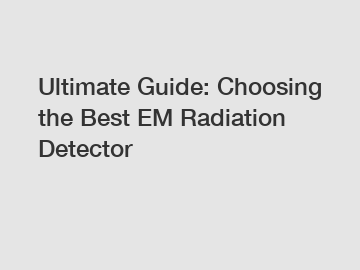Ultimate Guide: Choosing the Best EM Radiation Detector
If you're concerned about the potential health risks associated with electromagnetic (EM) radiation, investing in a reliable EM radiation detector is a smart move. With so many options on the market, choosing the best one for your needs can be overwhelming. That's why we've created the ultimate guide to help you make an informed decision.
First and foremost, it's important to understand what EM radiation is and why it's important to measure it. EM radiation is a form of energy that is produced by electronic devices, power lines, and even natural sources like the sun. While EM radiation is all around us, prolonged exposure to high levels of certain types of EM radiation can have negative health effects, including an increased risk of cancer.
When it comes to choosing an EM radiation detector, there are a few key factors to consider. The first is the type of radiation you want to measure. Different detectors are designed to measure different types of EM radiation, such as ionizing radiation like X-rays and gamma rays, or non-ionizing radiation like radio waves and microwaves.

Next, you'll want to consider the sensitivity of the detector. Some detectors are more sensitive than others, meaning they can detect lower levels of radiation. If you're concerned about very low levels of EM radiation, a highly sensitive detector is essential.
Another important factor to consider is the range of frequencies the detector can measure. EM radiation covers a wide range of frequencies, from extremely low frequency (ELF) radiation to radio waves, microwaves, and even visible light. Make sure the detector you choose can measure the range of frequencies you're concerned about.
Ease of use is also an important consideration. Some detectors are simple to use, with just a single button to press, while others have more advanced features that may require a bit of a learning curve. Choose a detector that you feel comfortable using, so you can easily monitor the levels of EM radiation in your environment.
Accuracy is perhaps the most important factor when choosing an EM radiation detector. You want a detector that will provide accurate and reliable measurements, so you can trust the data it is giving you. Look for detectors that have been independently tested and proven to be accurate.
When it comes to price, EM radiation detectors can vary greatly in cost. While it may be tempting to choose a cheaper option, keep in mind that you get what you pay for. Investing in a quality detector may cost more upfront, but it will provide you with accurate and reliable measurements for years to come.
One of the best ways to ensure you're choosing the best EM radiation detector is to read reviews from other customers. Look for detectors with positive reviews that praise their accuracy, ease of use, and reliability. Reading real-world experiences can help you make an informed decision.
In conclusion, choosing the best EM radiation detector is essential for protecting yourself and your loved ones from the potential health risks associated with EM radiation. By considering factors like the type of radiation you want to measure, sensitivity, frequency range, ease of use, accuracy, and price, you can find a detector that meets your needs. Be sure to read reviews and do your research before making a purchase. With the right detector in hand, you can monitor the levels of EM radiation in your environment and take steps to reduce your exposure. Stay informed, stay safe, and choose the best EM radiation detector for your peace of mind.
If you are looking for more details, kindly visit introduction to radiation detectors, I-131 radiotherapy, radiation detection and measurement solutions.
211
0
0

Comments
All Comments (0)